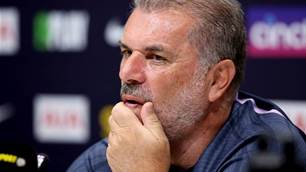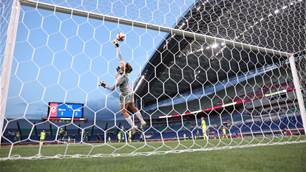He has become known as 'Big Sam' and you get the feeling Sam Allardyce secretly likes the label. Not that he would ever admit it.
What it does is allow the 52-year-old to hide behind his public persona while getting on with the job in hand - which is winning football matches.
This is the man who has taken ailing old Bolton Wanderers from mediocrity to the brink of breaking the hegemony of English football's 'big four'.
But when his name was thrown into the ring to succeed England coach Sven-Goran Eriksson there were snorts of disgust and ridicule.
The word is in terms of interview alone his was the best of all the prospective candidates. That he lost out to Steve McClaren probably still rankles with the Dudley-born manager as it was a job he desperately wanted.
It would have given him the platform to show just how good a manager he is and afforded him credibility.
Credibility which was brought into question when he was forced to deny any link to a bungs scandal in the BBC Panorama programme 'Undercover: Football's Dirty Secrets'.
Allardyce and his son Craig, formerly a football agent, were alleged to have been given illegal payments to facilitate player transfers.
His success with Bolton has been remarkable but whatever the achievement - he was the first man to lead the club into Europe in the 2005-06 season - there was always the qualification 'but it's only Bolton'.
Which was a touch unfair when you consider the progress he made at the Reebok Stadium.
He took over in 1999 with the club in the bottom half of the old first division. Within a year Wanderers were FA Cup and League Cup semi-finalists and play-off finalists.
They were defeated in all but returned to the Premiership in 2001 and became the first Bolton side to survive in the top flight for 33 years. Since then Allardyce has not only managed to confound the critics but carve out a successful existence for Bolton in and around the top 10.
Allardyce's philosophy has been built on canny loan signings and free transfers allied to the appliance of science behind the scenes.
The likes of Fredi Bobic, Youri Djorkaeff, Bruno N'Gotty, Jay-Jay Okocha, Emerson Thome, Ivan Campo, Ibrahim Ba and Fernando Hierro were all persuaded to pitch up at the Reebok.
Some came with 'difficult' reputations but Allardyce managed to coax the best out of them with some astute man-management and an attention to detail on the technical side.
Allardyce was one of the first managers to use ProZone, the computer system that tracks every physical detail of a player during a match. He is wired up to an earpiece during games and has consulted the expertise of Humphrey Walters, the business guru Sir Clive Woodward credits as being a big influence in England's 2003 rugby union World Cup victory.
Allardyce, a man who is interested in art and is a prominent supporter of male cancer charity Everyman, has also embraced other non-football methods such as massages, t'ai chi, yoga and Pilates.
It is all a far cry from his humble beginnings on a council estate in Dudley and slightly surprising for someone who admits he hated school. However, on the positive side it propelled him into football.
"At the age of nine, I stood on the North Bank at Molineux and watched Wolverhampton Wanderers. Derek Dougan, Peter Knowles, Frank Munro, Dave Wagstaffe, Ernie Hunt, and I decided there and then I was going to be a footballer," he said.
"After that day, I never really watched much football, just dedicated myself to playing the game. All I wanted to do was go to the gym or play football."
He was given his chance at Bolton, where he spent the first 11 years of his career; making his league debut in 1973 and winning the second division title in 1978.
Allardyce, a no-nonsense centre-half, left for Sunderland in 1980 and made 214 appearances for the north-east club, before becoming something of a journeyman, representing Millwall, Coventry and Huddersfield - as well as a spell in the United States with the Tampa Bay Rowdies - all within four years.
He returned to Bolton in 1985 but played only 14 times before moving to Preston and West Brom, where he took his first fledgling steps on the road to management as player-coach.
Preston was his next coaching assignment, where he had a brief spell as caretaker manager, before his first permanent appointment as boss came with Limerick in the Irish league.
Blackpool were the first English club to spot his managerial potential in July 1994 but, when the team threw away automatic promotion at the end of the 1995-96 season, he was replaced.
Notts County, bottom of the old second division, came calling in January 1997 and Allardyce embraced the challenge after their relegation, winning the Division Three title the very next season.
From there the only way was up and he quit the County Ground on October 14, 1999 to become Bolton manager five days later.
This is the man who has taken ailing old Bolton Wanderers from mediocrity to the brink of breaking the hegemony of English football's 'big four'.
But when his name was thrown into the ring to succeed England coach Sven-Goran Eriksson there were snorts of disgust and ridicule.
The word is in terms of interview alone his was the best of all the prospective candidates. That he lost out to Steve McClaren probably still rankles with the Dudley-born manager as it was a job he desperately wanted.
It would have given him the platform to show just how good a manager he is and afforded him credibility.
Credibility which was brought into question when he was forced to deny any link to a bungs scandal in the BBC Panorama programme 'Undercover: Football's Dirty Secrets'.
Allardyce and his son Craig, formerly a football agent, were alleged to have been given illegal payments to facilitate player transfers.
His success with Bolton has been remarkable but whatever the achievement - he was the first man to lead the club into Europe in the 2005-06 season - there was always the qualification 'but it's only Bolton'.
Which was a touch unfair when you consider the progress he made at the Reebok Stadium.
He took over in 1999 with the club in the bottom half of the old first division. Within a year Wanderers were FA Cup and League Cup semi-finalists and play-off finalists.
They were defeated in all but returned to the Premiership in 2001 and became the first Bolton side to survive in the top flight for 33 years. Since then Allardyce has not only managed to confound the critics but carve out a successful existence for Bolton in and around the top 10.
Allardyce's philosophy has been built on canny loan signings and free transfers allied to the appliance of science behind the scenes.
The likes of Fredi Bobic, Youri Djorkaeff, Bruno N'Gotty, Jay-Jay Okocha, Emerson Thome, Ivan Campo, Ibrahim Ba and Fernando Hierro were all persuaded to pitch up at the Reebok.
Some came with 'difficult' reputations but Allardyce managed to coax the best out of them with some astute man-management and an attention to detail on the technical side.
Allardyce was one of the first managers to use ProZone, the computer system that tracks every physical detail of a player during a match. He is wired up to an earpiece during games and has consulted the expertise of Humphrey Walters, the business guru Sir Clive Woodward credits as being a big influence in England's 2003 rugby union World Cup victory.
Allardyce, a man who is interested in art and is a prominent supporter of male cancer charity Everyman, has also embraced other non-football methods such as massages, t'ai chi, yoga and Pilates.
It is all a far cry from his humble beginnings on a council estate in Dudley and slightly surprising for someone who admits he hated school. However, on the positive side it propelled him into football.
"At the age of nine, I stood on the North Bank at Molineux and watched Wolverhampton Wanderers. Derek Dougan, Peter Knowles, Frank Munro, Dave Wagstaffe, Ernie Hunt, and I decided there and then I was going to be a footballer," he said.
"After that day, I never really watched much football, just dedicated myself to playing the game. All I wanted to do was go to the gym or play football."
He was given his chance at Bolton, where he spent the first 11 years of his career; making his league debut in 1973 and winning the second division title in 1978.
Allardyce, a no-nonsense centre-half, left for Sunderland in 1980 and made 214 appearances for the north-east club, before becoming something of a journeyman, representing Millwall, Coventry and Huddersfield - as well as a spell in the United States with the Tampa Bay Rowdies - all within four years.
He returned to Bolton in 1985 but played only 14 times before moving to Preston and West Brom, where he took his first fledgling steps on the road to management as player-coach.
Preston was his next coaching assignment, where he had a brief spell as caretaker manager, before his first permanent appointment as boss came with Limerick in the Irish league.
Blackpool were the first English club to spot his managerial potential in July 1994 but, when the team threw away automatic promotion at the end of the 1995-96 season, he was replaced.
Notts County, bottom of the old second division, came calling in January 1997 and Allardyce embraced the challenge after their relegation, winning the Division Three title the very next season.
From there the only way was up and he quit the County Ground on October 14, 1999 to become Bolton manager five days later.
Copyright (c) Press Association
Related Articles

Postecoglou looking to A-League to 'develop young talent'
.jpeg&h=172&w=306&c=1&s=1)
Big change set to give Socceroos star new lease on life in the EPL













